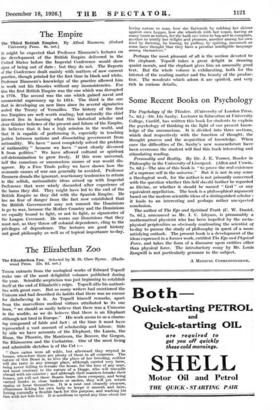The Empire
The Third British Empire. By Alfred Zimmern. (Oxford University Press. 6s. net.).
Jr might be expected that Professor Zimmern's lectures on the development of the British Empire delivered in the United States before the Imperial Conference would show signs of being out of date : but they do not. The Reports of the Conference dealt mainly with matters of now current practice, though printed for the first time in black and white. Professor Zimmern's knowledge of the practice allowed him to work out his theories without any inconsistencies. For him the first British Empire was the one which was disrupted in 1776. The second was the one which gained naval and commercial supremacy up to 1914. The third is the one that is developing on new lines since its several signatories sealed the Treaty of Versailles. The history of the first two Empires are well worth reading, but naturally the chief interest lies in learning what this historical scholar and clear thinker believes of the present and future of the Empire. He believes that it has a high mission in the world, and that it is capable of performing it, especially in teaching justice between nations and dissociating government from nationality. We have " most completely solved the problem of nationality " because we have " most clearly divorced It from politics." We have allowed cultural or spiritual self-determination to grow freely. If this were universal, half the conscious or unconscious causes of war would dis- appear. By a Free Trade policy we have shown how the economic causes of war can generally be avoided. Professor Zimmern dreads the ignorant, reactionary tendencies to return to the selfish, nationalistic ideas mixed up with Imperial Preference that were wisely discarded after experience of the harm they did. They might have led to the end of the British Empire as they did with the Spanish Empire. He has no fear of danger from the fact now established that the British Government may not commit the Dominions to go to war, because the Mother Country and the Dominions are equally bound to fight, or not to fight, as signatories of the League Covenant. He warns our Dominions that they must not, as they throw off colonial dependence, cling to the privileges of dependence. The lectures are good history and good philosophy as well as of topical importance to-day.










































 Previous page
Previous page